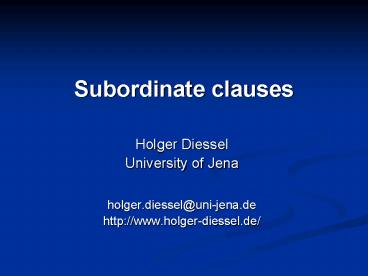Subordinate clauses - PowerPoint PPT Presentation
1 / 15
Title:
Subordinate clauses
Description:
so woman-you garden work-you. you woman work the garden. c. naki ali ha?noma ... (6) While working on the homework assignment, I fell asleep. Complement clauses ... – PowerPoint PPT presentation
Number of Views:1325
Avg rating:3.0/5.0
Title: Subordinate clauses
1
Subordinate clauses
- Holger Diessel
- University of Jena
- holger.diessel_at_uni-jena.de
- http//www.holger-diessel.de/
2
Subordinate clauses
coordination
subordination
Adverbial clauses
Complement clauses
Relative clauses
finite
nonfinite
finite
nonfinite
finite
nonfinite
3
Exercise
(1) The man who Peter talked to at the store is
his father. (2) I am looking for the key that
was on table before I left. (3) Sally noticed
the man who came into the store. (4) This is
the cat whose kitten we found in the barn. (5)
The dog running down the street is barking. (6)
Mary wants the ball Peter is playing with. (7)
Thats the boy who Peter gave the ball (to).
4
Exercise
(1) He makes me cry. (2) Thats all I
want. (3) Leaving home I noticed that I was
running late. (4) Show me the stuff Sally
bought when she was here. (5) It is quit
likely that Peter will win the game. (6) To
make more money you have to work harder. (7)
The car parked on the other side of the street
has a flat tire. (8) If it is raining we will
meet at the corner where you picked me up last
time. (9) I want you to give me the book Peter
talked about. (10) Since the arrival of the
British team they tried to impress their hosts.
5
Coordination
(1) a. Peter and Mary b. come and go c.
in the garden and on the street d. Mary is
sleeping and Peter is working
Kawaiisu (2) iga-k-naina kakari-naina Enter-
DIR-COMP-3SG sit-COMP-3SG He came in (and)
sit-COMP-3SG
6
Adverbial clauses
- temporal clauses
- causal clauses
- conditional clauses
- purpose clauses
- concessive clauses
- conditional concessive clauses
- result clauses
7
Adverbial clauses
(1) We left after Mary had given her
speech. (2) We left because Mary wasnt
there. (3) We will leave if Mary isnt
there. (4) We will leave in order to see
her. (5) We left early although it was a great
party. (6) We will leave early even if I dont
have to work tomorrow. (7) We left early so that
Peter wouldnt miss the train.
8
Adverbial clauses
(1) a. Peter admitted that Mary was right before
he left. b. Before he left Peter admitted
that Mary was right. c. Peter admitted,
before he left, that Mary was right.
(2) a. Peter admitted that Mary was right and
(then he) left. b. And he left Peter
admitted that Mary was right. c. Peter
admitted, and he left, that Mary was right.
9
Adverbial clauses
(1) a. When hei came to Leipzig, Peteri met
Mary. b.Hei came to Leipzig, and Peteri met
Mary.
(2) a. What did you tell her __ when you
left? b. What did you tell her __ and you
left.
10
Cosubordination
a. his-u?a-ke-?ka do-we-DS-you If we do this,
b. naki a?nemo-ka hoya ali-?ka so woman-you
garden work-you you woman work the
garden c. naki ali ha?noma hu-ne?atale-?
ka so work finish do-COMPL-you when
you have finished the work d. popo
hu-?ka hoe do-you you hoe
11
Cosubordination
e. inuna kae-?ka weeds burn-you
you burn the weeds f. naki
ha?no hu-talete-ke-ta?a so finish do-COMPL-DS
-we when it is finished g. naki viemoka-ta?a k
eki?yamo?ma so men-we fence ha?noma nehis-
i-ana finish make-it-IRR we men will finish
making the fence.
12
Cosubordination
13
Complement clauses
(1) That the students are always late is
annoying. (2) The teacher is annoyed that the
students are always late.
14
Complement clauses
(1) Peter tried to convince John to
leave. (2) Sally made me cry. (3) John persuaded
me to leave. (4) Bill expected his brother to be
there.
(5) The car parked on the other side of the
street is blue. (6) While working on the homework
assignment, I fell asleep.
15
Complement clauses
1. verbs of perception see, hear, smell 2.
mental state verbs think, know, believe 3.
communication verbs say, tell, argue 4. verbs
of desire wish, hope 5. manipulative
verbs make, force, cause































